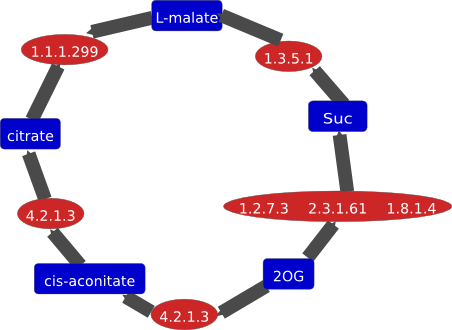EC Number   |
General Information   |
Reference   |
|---|
    2.7.1.11 2.7.1.11 | drug target |
overexpression of phosphofructokinase-P by cancer cells is related to activation of survival pathways via upregulation ofMAPK and suggest PFK-P as a promising target for cancer therapy |
761582 |
    2.7.1.11 2.7.1.11 | malfunction |
a knockout of 6-phosphofructokinase I and blocking of the Entner-Doudoroff pathway efficiently increased riboflavin production in Escherichia coli |
-, 760770 |
    2.7.1.11 2.7.1.11 | malfunction |
knockdown of phosphofructokinase-1 promotes neurogenesis by enhancing the proliferation of neural progenitors and instructing these progenitors to adopt a neuronal fate, and this effect is achieved by the upregulation of Mash 1, NeuroD, and Sox2 |
762013 |
    2.7.1.11 2.7.1.11 | malfunction |
mutations in the muscle 6-phosphofructokinase gene cause Tarui disease |
721506 |
    2.7.1.11 2.7.1.11 | malfunction |
phosphofructo-1-kinase deficiency leads to a severe cardiac and hematological disorder in addition to skeletal muscle glycogenosis, the lack of PFK activity blocks glycolysis and results in considerable glycogen storage and low ATP content, although erythrocytes of PFK knockout mice preserve 50% of PFK activity, they show strong reduction of 2,3-biphosphoglycerate concentrations and hemolysis, PFK knockout mice exhibit high lethality and skeletal muscle glycogenosis |
706411 |
    2.7.1.11 2.7.1.11 | malfunction |
silencing of phosphofructokinase-P does not alter HeLa cell viability or energy production, including the glycolytic rate. Silencing of PFK-P induces the downregulation of p44/42 MAPK, augmenting the sensitivity of HeLa cells to different drugs |
761582 |
    2.7.1.11 2.7.1.11 | metabolism |
in Escherichia coli, the phosphorylation of fructose-6-phosphate is catalyzed by two isozymes, 6-phosphofructokinase I (pfkA) and 6-phosphofructokinase II (pfkB). More than 90% of the phosphofructokinase activity relies on pfkA. A knockout of 6-phosphofructokinase I and blocking of the Entner-Doudoroff pathway efficiently increased riboflavin production in Escherichia coli |
-, 760770 |
    2.7.1.11 2.7.1.11 | metabolism |
key glycolytic enzyme |
761579 |
    2.7.1.11 2.7.1.11 | metabolism |
the enzyme catalyzes a rate-limiting reaction in glycolysis. The enzyme (PFKP) promotes EGFR activation-induced nuclear translocation and activation of beta-catenin in a PFKP Y64 phosphorylation-dependent manner, thereby enhancing the expression of beta-catenin downstream genes CCND1 and MYC. Thus, PFKP Y64 phosphorylation enhances tumor cell migration, invasion, proliferation, and brain tumor growth |
761161 |
    2.7.1.11 2.7.1.11 | metabolism |
the enzyme is involved in glycolysis |
760907 |





